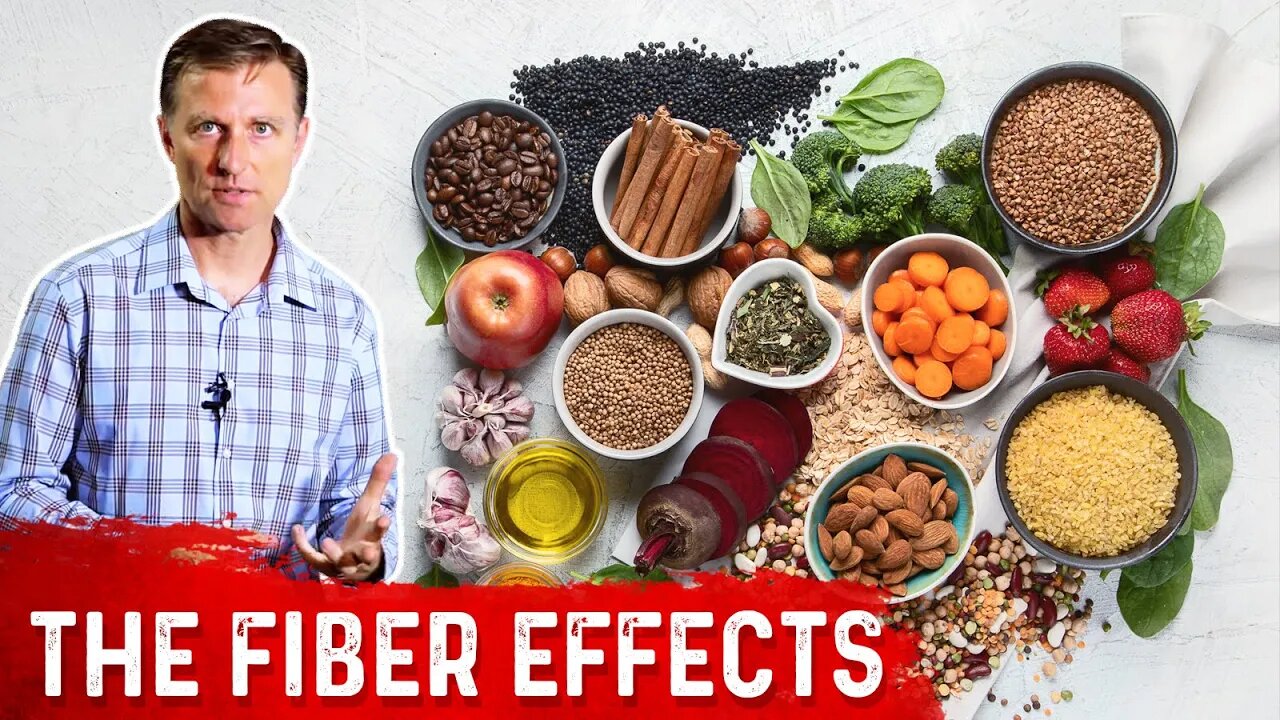Premium Only Content

Effects of Fibers on Blood Sugar & Glycemic Index – Dr. Berg
Your blood sugar is affected by the amount of fiber in the carbs you eat.
Timestamps:
0:00 Your blood sugar is affected by fiber in the carbs you eat
0:24 I define glycemic index and glycemic load
1:44 A cooked potato affects your blood sugars much more than a carrot, because of the fiber in the carrot
In this video, I talk about fiber, carbs, and blood sugar. Typically, on keto, you want to keep your carb intake between twenty and fifty grams per day. But it’s very important to look at the type of carb you’re consuming.
For background, I’ll define two things. The first is the glycemic index, which measures how fast the glucose is spiked in your blood. The second is the glycemic load, which is a measure of the quantity of carbohydrates in a particular food item. And it’s offset by fiber; so, if a certain food contains carbohydrates but most of it is fiber, that food would be on the low side.
Let’s compare a carrot and a potato. The glycemic index of a carrot is 72, which is fairly high. A potato has a glycemic index of 60 to 110. It’s potentially lower than a carrot if the potato is boiled. But if you further mash it or otherwise break it down, the potato’s score will go higher.
The glycemic load of a boiled potato is 31, which is high. Anything over 20 is high. A carrot’s glycemic load is 3, which is very low. (Anything below 10 is low.) The potato has ten times the glycemic load, because of the fiber content of the carrot, which puts its load so low. Carrots are much safer!
When you read food labels, be sure to check the sugar content along with the carb content. If the sugar content is low, chances are that food has a low glycemic load. When you eat food with a low glycemic load, it’s often due to its fiber content, and it won’t cause your blood sugar to spike.
Dr. Eric Berg DC Bio:
Dr. Berg, age 56, is a chiropractor who specializes in Healthy Ketosis & Intermittent Fasting. He is the author of the best-selling book The Healthy Keto Plan, and is the Director of Dr. Berg Nutritionals. He no longer practices, but focuses on health education through social media.
Follow us on FACEBOOK: fb.me/DrEricBerg
Send a Message to his team: m.me/DrEricBerg
ABOUT DR. BERG: https://bit.ly/39LCWg8
Disclaimer: Dr. Eric Berg received his Doctor of Chiropractic degree from Palmer College of Chiropractic in 1988. His use of “doctor” or “Dr.” in relation to himself solely refers to that degree. Dr. Berg is a licensed chiropractor in Virginia, California, and Louisiana, but he no longer practices chiropractic in any state and does not see patients so he can focus on educating people as a full-time activity, yet he maintains an active license. This video is for general informational purposes only. It should not be used to self-diagnose and it is not a substitute for a medical exam, cure, treatment, diagnosis, and prescription or recommendation. It does not create a doctor-patient relationship between Dr. Berg and you. You should not make any change in your health regimen or diet before first consulting a physician and obtaining a medical exam, diagnosis, and recommendation. Always seek the advice of a physician or other qualified health provider with any questions you may have regarding a medical condition.
Thanks for watching!
Your blood sugar won’t spike if you eat food that is high in fiber to offset the effects of the carbs it contains.
-
 6:38
6:38
Dr. Eric Berg
2 days agoThe Shocking Truth About Vaccines
5.44K50 -
 LIVE
LIVE
Donald Trump Jr.
1 hour agoFull Court Press: Sen Eric Schmitt Writes New Playbook for the Left's Lawfare | TRIGGERED Ep.270
745 watching -
 LIVE
LIVE
The Jimmy Dore Show
14 minutes agoSnoop Dogg Is DONE w/ LBGTQ+ Propaganda In Kids Movies! Trump Outlaws Burning the U.S. Flag!
2,968 watching -
 LIVE
LIVE
Kim Iversen
1 hour agoSomeone Stole Kim's Identity — And Bought a Car! | Dr Drew Pinsky On Sex, Drugs & Censorship
3,534 watching -
 LIVE
LIVE
TheCrucible
1 hour agoThe Extravaganza! Ep. 26 (with special guest host Rob Noerr) 8/25/25
6,285 watching -
 LIVE
LIVE
Tundra Tactical
43 minutes agoI Can’t Believe I’m Saying This… 2011’s Are Actually COOL Now?! 🤯
32 watching -
 LIVE
LIVE
Wayne Allyn Root | WAR Zone
3 hours agoWAR Zone LIVE | 25 AUGUST 2025
46 watching -
 UPCOMING
UPCOMING
Outspoken with Dr. Naomi Wolf
2 hours ago"CPA/Whistleblower Sam Antar Identifies Millions in Fraud Behind Mamdani Campaign"
197 -
 41:26
41:26
Kimberly Guilfoyle
2 hours agoMaking DC Safe Again, Live with Daily Signal's Tyler O'Neil | Ep249
59.6K16 -
 LIVE
LIVE
Dr Disrespect
6 hours ago🔴LIVE - DR DISRESPECT VS. JEAN-CLAUDE VAN DAMME - HITMAN
1,393 watching